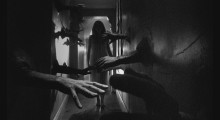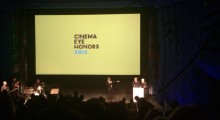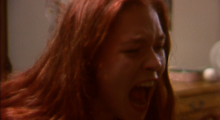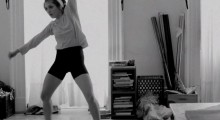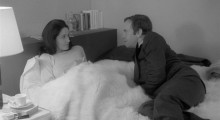Authors — Sarah Salovaara
-
Approaching the Elephant, She’s Lost Control, L For Leisure and I Believe in Unicorns to Have Theatrical Runs at Screen Forward

Following the Fall and Winter slate of Summer of Blood, Thou Wast Mild and Lovely, Butter on the Latch, The Foxy Merkins and the currently screening Something, Anything, IFP has announced their Spring lineup for Screen Forward. The four films set for week long theatrical runs at Dumbo’s Made in NY Media Center by IFP are Approaching the Elephant, She’s Lost Control, I Believe in Unicorns and L For Leisure. Both Approaching the Elephant and L For Leisure screened in MoMa and Filmmaker‘s Best Film Not Playing At A Theater Near You series last December, while Approaching the Elephant and I Believe in Unicorns participated in IFP’s Independent Film Labs. Find […]
by Sarah Salovaara on Jan 15, 2015 -
BitTorrent and Theatrical? David Cross to Self-Release Hits

BitTorrent has been flirting with creators for a little while now, releasing Thom Yorke’s Tomorrow’s Modern Boxes to the tune of $20 million in sales, as well as a free supplement to The Act of Killing, which was downloaded by 3.5 million in a month alone. Leave it to iconoclastic comedian David Cross then to push the envelope and digitally release his debut Hits for a pay what you wish pricetag. The film will also be available on iTunes, likely for the $14.99+ standard, but Cross is putting his stock in the erasure of the middleman, encouraging audiences to “decide how much tickets cost and…pay […]
by Sarah Salovaara on Jan 14, 2015 -
Watch: What if Béla Tarr Made Polanski’s Repulsion?

“Inside every narrative film is a non-narrative film struggling to get out.” Here is a wonderfully distinctive video essay from critics Adrian Martin and Christina Álvarez López that reimagines Roman Polanski’s Repulsion as the work of Béla Tarr. Zeroing in on “the dank spaces and the dead moments, the images of food-as-object, the cycle of everyday activities, the endless, implacable passages of walking,” and other Tarr associated imagery, Martin and López explore filmmaking as elementary particles, tonally rearrangeable in line with a director’s vision and story. In a supplementary write-up at MUBI, the two cite Jonathan Rosenbaum’s review of The Tenant, wherein […]
by Sarah Salovaara on Jan 12, 2015 -
Watch: Creating Charlie Hebdo’s Most Controversial Cover

“What’s clever here is that we don’t actually depict Muhammad. We can’t see Muhammad’s face. That’s a fact.” With the terrible attack on Paris’s Charlie Hebdo offices culminating in a two-fold siege earlier today, with the presumed perpetrators now dead, The New York Times has posted an Op-Doc that provides a haunting look inside the creative process behind one of the magazine’s most controversial covers. Shot in 2006, when the directors Jérôme Lambert and Philippe Picard were filming a documentary on the now deceased Jean Cabut, the short film parses the provocation that purportedly led to the death of Cabut and his colleagues. The film is […]
by Sarah Salovaara on Jan 9, 2015 -
CITIZENFOUR Wins Big at the 8th Annual Cinema Eye Honors

“Eight years ago, the shortlist came out, and the Academy failed to recognize not just three or four good films. They left off all the good films,” began Laura Poitras, the first presenter and undisputed star of last night’s 8th Annual Cinema Eye Honors, held at Astoria’s Museum of Moving Image. Recounting a bit of the organization’s history before bestowing Finding Vivian Maier with Best Debut, Poitras remarked that Founding Director AJ Schnack forged a necessary “response to what was happening in the community” in creating this close-knit, nonfiction awards ceremony. Cinema Eye Honors is always a pleasure to attend on account of that sense of “community,” […]
by Sarah Salovaara on Jan 8, 2015 -
2015 Rotterdam International Film Festival Line-Up

Falling smack dab in the middle of this year’s Sundance, the Rotterdam International Film Festival presents a hearty, intercontinental alternative to the Park City indie calendar starter. The program has trickled out over the last few weeks, and looks to be about buttoned up with the Spectrum and Bright Future sections announced today. Of note on the American end is the world premiere of Nathan Silver’s Stinking Heaven, which I covered on a set visit this summer, and the international premiere of Britni West’s Tired Moonlight, starring Alex Karpovsky. There’s also a generous helping of some of last year’s most notable festival circuit […]
by Sarah Salovaara on Jan 7, 2015 -
Watch: Auteur in Space, ::kogonada on Tarkovsky’s Solaris

“It is art that triumphs here, that speaks to the mystery of existence,” suggests the narrator of this new video essay from ::kogonada on Tarkovsky’s Solaris. Envisioning the filmmaker’s psychological meditation in stark contrast to the purported gadgets and gizmos of 2001: A Space Odyssey, “Auteur in Space” breaks down the humanity and pathos at the center of this most unusual sci-fi. Head to Sight&Sound to watch.
by Sarah Salovaara on Jan 6, 2015 -
Watch: Alfred Hitchcock’s Visual Gallery

Here is a rather comprehensive look at the visual motifs apparent throughout the formative years of Alfred Hitchcock’s illustrious career, from 1934’s The Man Who Knew Too Much to 1976’s Family Plot. Whether staging action around a staircase or riffing on the illusion of free fall, Hitchcock revisited and realigned techniques from one decade to the next. This compilation from Steven Benedict breaks down the visual grammar of 42 of the filmmaker’s features, stitching together his preferred still images with his swooping camera techniques, including a personal favorite: Gregory Peck’s POV as he drinks a glass of milk in Spellbound.
by Sarah Salovaara on Jan 5, 2015 -
The 2014 NoBudge Awards Winners

The NoBudge Awards may not be as hotly anticipated as other statuettes doled out at this time of year, but Kentucker Audley’s annual selections are still well worth paying attention to, if not solely for the fact that you won’t find their winners anywhere else on the circuit. A quasi year in review of his own programming, the NoBudge Awards spotlight films that screened on the site for a minimum of thirty days. I’ll cop to not having seen most of these, but can recommend Joy Kevin, Whiffed Out and The Greggs. Another nice detail that sets this list apart is that Audley doesn’t […]
by Sarah Salovaara on Jan 2, 2015 -
Watch: Why Are Christmas Films So Bleak?

Five days behind schedule, here’s a great Criterion essay from Michael Koresky on the bleak sentiments behind some of cinema’s classic and overlooked Christmastide tales. Suggesting the holiday’s proximity to winter solstice, and thus, the death of light, Koresky explores the backwards tendency to characterize a time of joy and harmony with mortality, existential crises, and dysfunction in Mon Oncle Antoine, My Night at Maud’s and A Christmas Tale. I’d scarcely be the first to suggest how peculiar it is that the quintessential all-ages Christmas film, It’s A Wonderful Life, is centrally preoccupied with suicide.
by Sarah Salovaara on Dec 30, 2014


